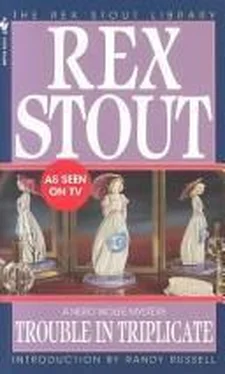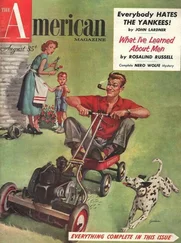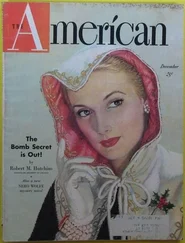Rex Stout - Trouble in Triplicate
Здесь есть возможность читать онлайн «Rex Stout - Trouble in Triplicate» весь текст электронной книги совершенно бесплатно (целиком полную версию без сокращений). В некоторых случаях можно слушать аудио, скачать через торрент в формате fb2 и присутствует краткое содержание. Жанр: Старинная литература, en-GB. Описание произведения, (предисловие) а так же отзывы посетителей доступны на портале библиотеки ЛибКат.
- Название:Trouble in Triplicate
- Автор:
- Жанр:
- Год:неизвестен
- ISBN:нет данных
- Рейтинг книги:5 / 5. Голосов: 1
-
Избранное:Добавить в избранное
- Отзывы:
-
Ваша оценка:
- 100
- 1
- 2
- 3
- 4
- 5
Trouble in Triplicate: краткое содержание, описание и аннотация
Предлагаем к чтению аннотацию, описание, краткое содержание или предисловие (зависит от того, что написал сам автор книги «Trouble in Triplicate»). Если вы не нашли необходимую информацию о книге — напишите в комментариях, мы постараемся отыскать её.
Trouble in Triplicate — читать онлайн бесплатно полную книгу (весь текст) целиком
Ниже представлен текст книги, разбитый по страницам. Система сохранения места последней прочитанной страницы, позволяет с удобством читать онлайн бесплатно книгу «Trouble in Triplicate», без необходимости каждый раз заново искать на чём Вы остановились. Поставьте закладку, и сможете в любой момент перейти на страницу, на которой закончили чтение.
Интервал:
Закладка:
“She was good at offering incentives,” I declared. “She was good period. The way she pretended here, Tuesday afternoon, that she wanted Poor to slap it and go live in the country and grow roses, with her to cook and darn socks.”
Wolfe nodded. “I admit she was ingenious. By the way, Mr. Groll, did she have an opportunity to conceal those four capsules in that desk calendar?”
“Yes,” Joe said. “Helen and I were discussing that. She came there Tuesday to go with Poor to the rodeo, and she could have done it then. Anyway, she had keys, she could have done it any time.”
“That was well conceived,” Wolfe said approvingly. “That and the hairs in the box of cigars. She was preparing for all contingencies. Neither of those touches was meant for you, Mr. Cramer, but for a jury in case it ever got to that. She had sense enough to know what a good lawyer could do with complications of that sort. Will you gentlemen have some beer?”
“No,” Cramer said bluntly. “I’ll have a question. Poor wasn’t here Tuesday afternoon?”
“No, sir. Arthur Howell was.”
“Then where was he?”
“At the rodeo.” Wolfe pushed a button, two pushes for beer. “Again Mrs. Poor was ingenious. Look at her schedule for Tuesday. She went to the Blaney and Poor office-what time, Mr. Groll?”
Helen answered. “She came around noon. They went to lunch together and then were going to the rodeo.”
“Thank you. So all she had to do was to make some excuse and see that he went to the rodeo alone. It was an ideal selection-Madison Square Garden, that enormous crowd. Then she met Arthur Howell somewhere near, having arranged for him to be dressed as her husband was dressed, and brought him here. She was driving her car-or her husband’s car. They left here a little before five o’clock. Between here and Forty-second Street he got out and went to Grand Central to take a train to White Plains. A woman who could persuade a man to help her kill her husband could surely persuade him to take a train to White Plains.” Fritz brought beer, and Wolfe opened a bottle and poured.
“Then she continued to Fiftieth Street and met her husband as he left the rodeo, and they drove to Westchester, having an appointment to see Mr. Blaney at his place there. She talked her husband out of that, left him at a place called Monty’s Tavern, drove somewhere, probably the White Plains railroad station, met Arthur Howell there as arranged, drove to an isolated spot probably previously selected, turned off the road into an orchard, killed Mr. Howell or knocked him unconscious with whatever she used for that purpose, removed his clothing, and ran the car over him to obliterate his face.”
A noise came from Helen Vardis. She had obliterated her own face by covering it with her hands. That gave Joe an excuse to touch her again, which he did.
“Granted her basic premise,” Wolfe went on, “she couldn’t very well have been expected to let Arthur Howell continue to live. She would never have had a carefree moment. What if Mr. Goodwin or I had met him on the street? That thought should have occurred to him, but apparently something about Mrs. Poor had made him quit thinking. There are precedents. Since she was good at detail, I presume she spread his coat over his head so as to leave no telltale matter on her tires. What she then did with the clothing is no longer of interest, at least not to me.”
He drank beer. “She proceeded. First to Mr. Blaney’s place to make sure, by looking through windows, that he was alone there, so that she could safely say that she had gone to see him and couldn’t find him. Again she was providing for all contingencies. If Arthur Howell’s body was after all identified, known as that of a man who was with the Beck Products Corporation and had access to those capsules, it would help to have it established that Mr. Blaney had not been at home during the time that Arthur Howell had been killed. It wouldn’t surprise me if a good search around Mr. Blaney’s place discovered Mr. Howell’s clothes concealed-no, that wouldn’t do, since they were the same as Mr. Poor’s. She wouldn’t make that kind of mistake.”
He emptied the glass. “The rest is anticlimax, though of course for her it was the grand consummation. She returned to Monty’s Tavern, told her husband Mr. Blaney had not been at home, dined with him, drove back to New York and went to their apartment, and got him a nice fresh cigar from a new box. Everything worked perfectly. It sounds more complicated than it really was. Such details as making sure that no photographs of her husband would be available for the newspapers had no doubt been already attended to.”
“That receipt you signed,” Cramer growled.
“What? Oh. That gave her no difficulty. Arthur Howell gave the receipt to her, naturally, and she put it in her husband’s pocket. That was important. It was probably the first thing she did after the cigar exploded.”
“Meanwhile you’ve got the five thousand dollars.”
“Yes, sir. I have.”
“But Poor didn’t pay it to you. You never saw Poor. You weren’t hired by him. If you want to say Mrs. Poor paid it, do you take money from murderers?” It was one of Cramer’s feeblest attempts to be nasty, certainly not up to his standard.
Wolfe merely poured beer and said, “Pfui. Whether Mr. Poor paid me or not, he got his money’s worth.” Try analyzing the logic of that. I can’t.
The World of Rex Stout
Now, for the first time ever, enjoy a peek into the life of Nero Wolfe’s creator, Rex Stout, courtesy of the Stout Estate. Pulled from Rex Stout’s own archives, here are rarely seen, some never-before-published memorabilia. Each title in “The Rex Stout Library” will offer an exclusive look into the life of the man who gave Nero Wolfe life.
At the time of Trouble in Triplicate ’s publication in 1949, The New Yorker magazine did a rather complimentary (and by no means embellished) piece on Rex Stout. One reader lacked sufficient faith in the great author and took the magazine to task for its claims. Here is his response.
DEPARTMENT OF AMPLIFICATION
July 14,1949
To the Editors, The New Yorker ,
Sirs:
IT is perilous at any time to take issue with a writer of Alva Johnston’s reputation. It is doubly dangerous when one may be taking issue at the same time with Rex Stout, who, to judge by Mr. Johnston’s recent Profile of him, could single-handed out-argue a team made up of Sam Leibowitz, Casey Stengel, and Donald Duck. Nevertheless, I am going to take issue with Mr. Johnston and let Mr. Stout shoulder his way into the matter if he feels like it.
In the Profile of Mr. Stout, Mr. J. says, “John Wallace Stout [Rex Stout’s father] had an extraordinary library. It consisted of about twelve hundred volumes of biography, history, fiction, philosophy, science, and poetry. Rex had read them all by the time he was eleven.”
I just plain don’t believe this assertion, that it is impossible for an eleven-year-old boy, Stout or not Stout, to have read twelve hundred assorted volumes of printed matter, especially of such printed matter as must have been in the Stout home fifty-odd years ago. It was a windy era, and books ran [???].
Читать дальшеИнтервал:
Закладка:
Похожие книги на «Trouble in Triplicate»
Представляем Вашему вниманию похожие книги на «Trouble in Triplicate» списком для выбора. Мы отобрали схожую по названию и смыслу литературу в надежде предоставить читателям больше вариантов отыскать новые, интересные, ещё непрочитанные произведения.
Обсуждение, отзывы о книге «Trouble in Triplicate» и просто собственные мнения читателей. Оставьте ваши комментарии, напишите, что Вы думаете о произведении, его смысле или главных героях. Укажите что конкретно понравилось, а что нет, и почему Вы так считаете.












